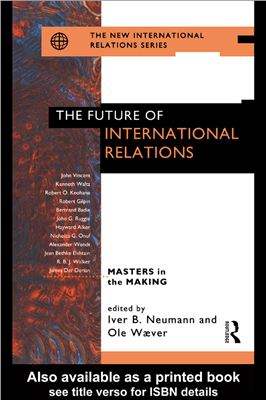Routledge, 1997. 409 p.
The Future of Inteational Relations presents the state of the art of inteational relations theory through an analysis of the work of twelve key contemporary thinkers. The authors break with the procedure in the field which juxtaposes aspects of the work of contemporary theorists with others, presenting them as part of a disembodied school of thought or paradigm. A more individual focus
can demonstrate instead, the well-rounded character of some of the leading oeuvres and can thus offer a more representative view of the discipline. The book covers the work of theorists whom students of inteational relations will read and sometimes struggle with. Each chapter places the thinker in the landscape of the discipline, identifies how they go about studying Inteational
Relations and discusses what others can lea from them.
The twelve theorists are: John Vincent, Kenneth Waltz, Robert O.Keohane, Robert Gilpin, Bertrand Badie, John G.Ruggie, Hayward Alker, Nicholas G.Onuf, Alexander Wendt, Jean Bethke Elshtain, R.B.J.Walker and James Der Derian.
Figures of inteational thought: introducing persons instead of paradigms. Ole W?ver.
John Vincent and the English School of Inteational Relations. Iver B.Neumann
Kenneth Waltz: a critical rationalist between inteational politics and foreign policy. Hans Mouritzen
Robert O.Keohane: a contemporary classic. Michael Suhr
Robert Gilpin: the realist quest for the dynamics of power. Stefano Guzzini
Bertrand Badie: cultural diversity changing Inteational Relations? Anna Leander
John G.Ruggie: transformation and institutionalization. Ole W?ver
Hayward Alker: an exemplary voyage from quantitative peace research to humanistic, late-mode globalism. Heikki Patom?ki
Nicholas G.Onuf: the rules of anarchy. Marlene Wind
Alexander Wendt: a social scientist struggling with history. Erik Ringmar
Jean Bethke Elshtain: traversing the terrain between. Jenny Edkins and V?ronique Pin-Fat
R.B.J.Walker and Inteational Relations: deconstructing a discipline. Lene Hansen
James Der Derian: the unbearable lightness of theory. Jef Huysmans
The Future of Inteational Relations presents the state of the art of inteational relations theory through an analysis of the work of twelve key contemporary thinkers. The authors break with the procedure in the field which juxtaposes aspects of the work of contemporary theorists with others, presenting them as part of a disembodied school of thought or paradigm. A more individual focus
can demonstrate instead, the well-rounded character of some of the leading oeuvres and can thus offer a more representative view of the discipline. The book covers the work of theorists whom students of inteational relations will read and sometimes struggle with. Each chapter places the thinker in the landscape of the discipline, identifies how they go about studying Inteational
Relations and discusses what others can lea from them.
The twelve theorists are: John Vincent, Kenneth Waltz, Robert O.Keohane, Robert Gilpin, Bertrand Badie, John G.Ruggie, Hayward Alker, Nicholas G.Onuf, Alexander Wendt, Jean Bethke Elshtain, R.B.J.Walker and James Der Derian.
Figures of inteational thought: introducing persons instead of paradigms. Ole W?ver.
John Vincent and the English School of Inteational Relations. Iver B.Neumann
Kenneth Waltz: a critical rationalist between inteational politics and foreign policy. Hans Mouritzen
Robert O.Keohane: a contemporary classic. Michael Suhr
Robert Gilpin: the realist quest for the dynamics of power. Stefano Guzzini
Bertrand Badie: cultural diversity changing Inteational Relations? Anna Leander
John G.Ruggie: transformation and institutionalization. Ole W?ver
Hayward Alker: an exemplary voyage from quantitative peace research to humanistic, late-mode globalism. Heikki Patom?ki
Nicholas G.Onuf: the rules of anarchy. Marlene Wind
Alexander Wendt: a social scientist struggling with history. Erik Ringmar
Jean Bethke Elshtain: traversing the terrain between. Jenny Edkins and V?ronique Pin-Fat
R.B.J.Walker and Inteational Relations: deconstructing a discipline. Lene Hansen
James Der Derian: the unbearable lightness of theory. Jef Huysmans

